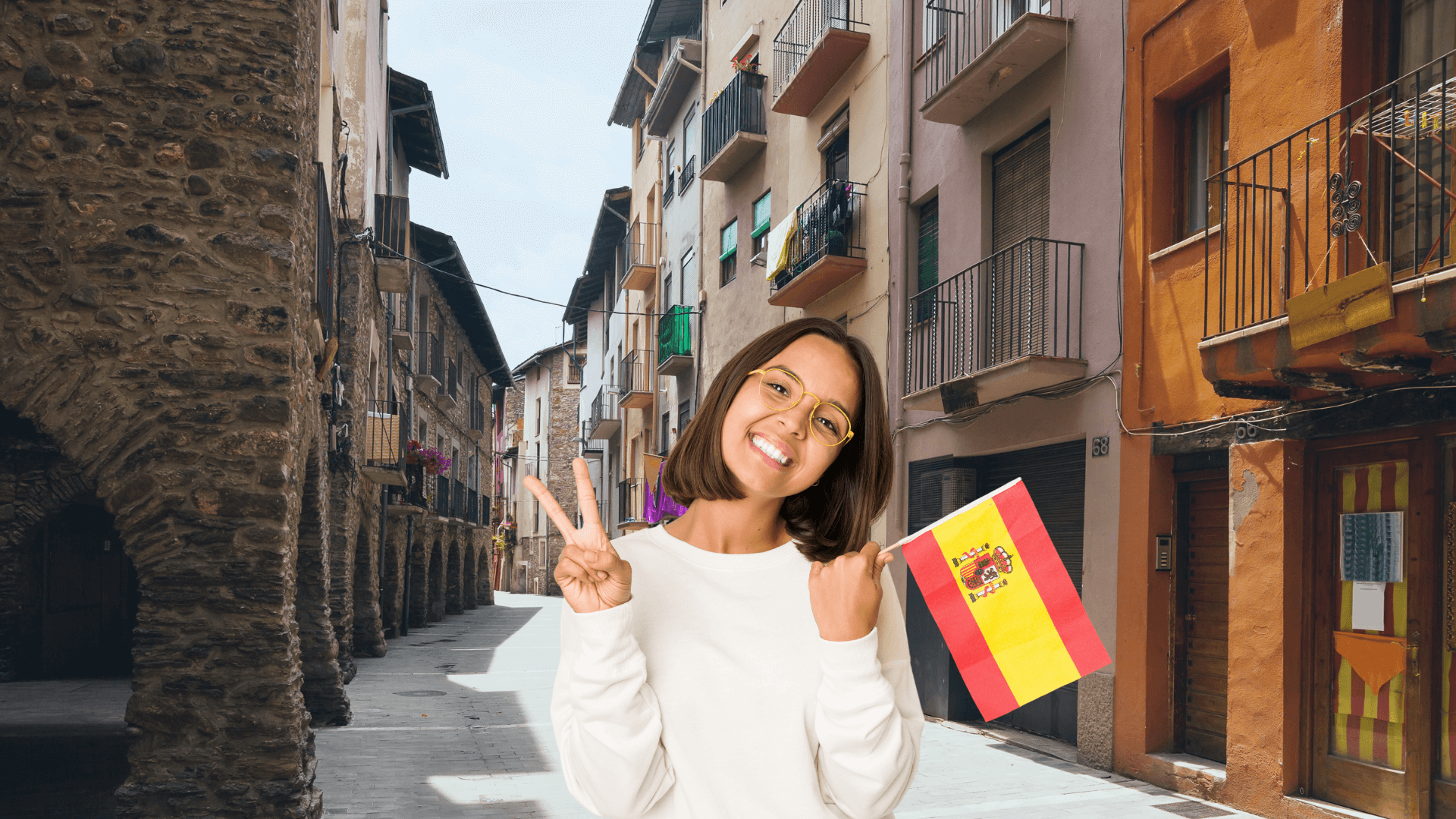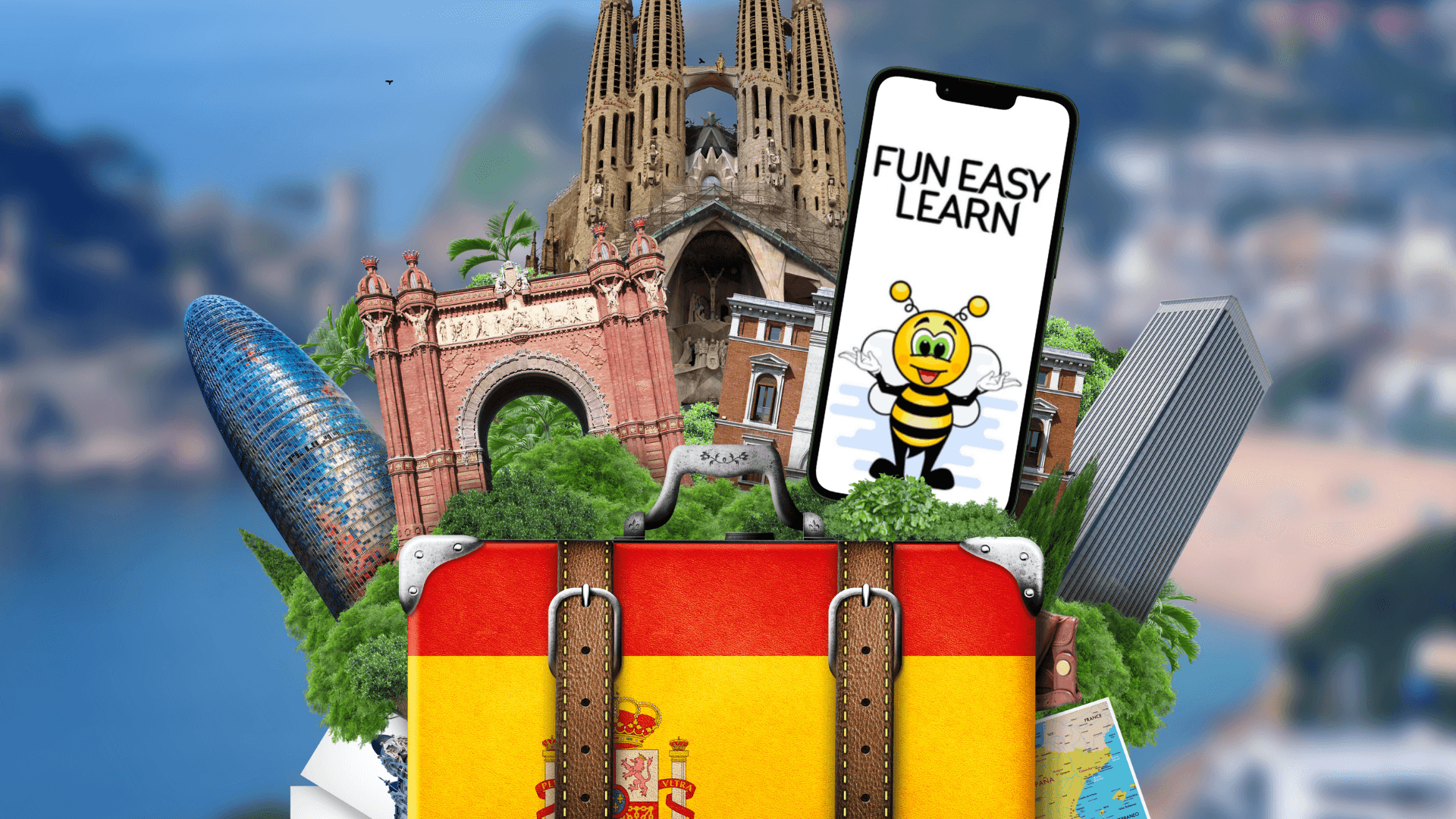Must-Know Spanish Phrases for Traveling - Your Vacation Cheatsheet

Speaking Spanish is highly important when traveling to destinations such as Spain, Mexico, Argentina, Peru, and Colombia. That is particularly needed if you want to go beyond major traditional areas and truly immerse yourself in the authentic culture and lifestyle. The staff at large hotels and restaurants usually speaks English. It's when you want to try something more local that Spanish comes in handy. Additionally, speaking the third most widely spoken language in the world offers numerous benefits.
Let's learn a set of Spanish phrases to help you navigate travel situations with confidence. Tailored for real-world scenarios, these lists cover the most important words, phrases, and expressions to help you navigate daily situations, communicate effectively, and build rapport with locals.
Dialects and Variations
Although there are several Spanish dialects and variations, they are mutually intelligible. So, learning one version is usually enough. Some of the most notable differences include the following:
- The Castilian dialect often uses the "th" sound for "c" and "z" (e.g., gracias sounds like "gra-thias"), while Latin American dialects pronounce these as "s."
- In Spain, you say "coche" when you mean car, but in most of Latin America, you need to use "carro" or "auto";
- In some areas, such as Argentina and Uruguay, the pronoun vos is used in place of tú for informal "you," with distinct verb conjugations.
- Caribbean dialects, such as Cuban or Puerto Rican, may drop consonants (e.g., "para" becomes "pa")
- Some words have different meanings across regions, which can lead to misunderstandings for travelers. For instance, "coger" means "to take" or "to catch" in Spain (e.g., catching a bus), but in parts of Latin America, like Mexico or Argentina, it can be a vulgar term for a sexual act. Similarly, "papa" means "potato" in most Spanish-speaking countries, but in Cuba, it can also refer to a father. Another example is "guagua," which means "bus" in the Caribbean but "baby" in parts of South America, such as Chile.
Despite these differences, speakers from different regions can understand each other with minimal effort. So, rest assured, they will appreciate you, too.
Greetings and Politeness

Greetings are essential when interacting with native speakers. Even when you're in a hurry, greeting a local before asking for their help is considered polite. On top of that, you need to know how to politely reply to greetings when you're at the hotel, restaurant, and other contexts. Even the deepest conversations and strongest friendships start with a plain "Hola."
- Hola - Hello
- Buenos días - Good morning
- Buenas tardes - Good afternoon
- Buenas noches - Good evening
- ¿Cómo estás? - How are you?
Note: In Chile and Spain, using ¿Cómo estás? The use of 'usted' is a sign of politeness, especially in more formal contexts or when addressing elderly people.
- Por favor - Please
- Gracias - Thank you
- Aprecio tu amabilidad - I appreciate your kindness
- ¿Puedo hacer una pregunta? - May I ask a question?
- Perdón / Lo siento - Excuse me / Sorry
- Adiós - Goodbye
Essential Phrases and Sentences
These fundamental Spanish phrases bridge communication gaps for basic needs and clarification. Even if you have a limited vocabulary, knowing a few key words can help you get a message across or understand simple tips, answers, and instructions.
- Dónde está…? - Where is…?
- ¿Cuánto cuesta esto? - How much is this?
- Lo siento, no entiendo - I’m sorry, I don’t understand
- ¿Hablas inglés? - Do you speak English?
- ¿Puedes ayudarme? - Can you help me?
- ¿Puedes repetir, por favor? - Can you please repeat that?
- ¿Podrías hablar más despacio, por favor? - Could you speak slower, please?
- No hablo muy bien español. - I don't speak Spanish very well
- Necesito… - I need…
- Sí - Yes
- No - No
- Lo siento, no hablo bien español - I’m sorry, I don’t speak Spanish well
- ¿Puedes escribirlo, por favor? - Can you write it down, please?
- Estoy aprendiendo español, por favor corrígeme - I’m learning Spanish, please correct me
Tip: Use a more polite tone in Spain to get an answer. In Mexico, don't forget to smile when asking for a favor or requesting a service.
Introductions and Socializing
Connect with locals and other tourists in Spanish. A few key phrases can help you make new friends and have a great vacation. Many learners skip introductions, fearing that it is not an important topic. However, it's introductions and basic socializing that can help you integrate into the target culture for the time of your stay or even longer. Practicing these phrases will improve your fluency and help you break the ice in a Spanish-speaking country.
- ¿Cómo te llamas? - What’s your name? (Most natural)
- Me llamo [Name] / Soy [Name] - My name is [Name] / I’m [Name].
- ¿De dónde eres? - Where are you from?
- 🇦🇷 Argentina: ¿De qué provincia sos? (Which province?)
- 🇪🇸 Formal Spain: ¿De dónde es usted?
- Soy de [your country] - I’m from [your country]
- Mucho gusto - Nice to meet you.
- Spain: Encantado (said by a man) / Encantada (said by a woman)
- Mexico: Gusto en conocerte
- ¿Cómo estás? - How are you? (informal)
- Reply: Bien, ¿y tú? - Good, and you?
- ¿Puedes recomendar un buen restaurante? - Can you recommend a good restaurant?
- ¿Podemos tomarnos una foto juntos? - Can we take a photo together?
- ¿Por qué es famoso este lugar? - What is this place famous for?
- ¿Cómo se dice [palabra/frase] en español? - How do you say [word/phrase] in Spanish?
- Gracias por tu ayuda - Thank you for your help (informal)
- Gracias por su ayuda - Thank you for your help (formal)
Transportation and Navigation
No matter how much you prepare for a trip abroad, you often need to ask about the schedule, stops, or change your itinerary. Whether you're catching a bus in Mexico City or looking for a landmark in Peru, these words, phrases, and sentences will help you find your way. Handle logistics confidently, save time, and stay on track.
- ¿Dónde estamos? - Where are we?
- ¿Puedes mostrarme en el mapa? - Can you show me on the map?
- ¿Dónde está la estación de autobús/tren? - Where is the bus/train station?
- ¿Cuándo sale el próximo autobús/tren? - When does the next bus/train leave?
- ¿Cuánto cuesta un boleto a…? - How much is a ticket to…?
- ¿Es este el camino a…? - Is this the way to…?
- ¿Puedes llevarme a [destino]? - Can you take me to [destination]?
- ¿Está ocupado este asiento? - Is this seat taken?
- ¿Dónde está la parada de taxis? - Where is the taxi stand?
- Para aquí, por favor - Please stop here
- ¿Es este el andén correcto? - Is this the right platform?
- ¿Con qué frecuencia pasa este autobús? - How often does this bus run?
- Andén - Platform
- Estación - Station
- Parada - Stop
- Horario - Schedule
- ¿Dónde está…? - Where is…?
- Gira a la derecha - Turn right
- Gira a la izquierda - Turn left
- Sigue recto - Go straight
- Entrada - Entrance
- Salida - Exit
- ¿A qué distancia está…? - How far is…?
- ¿Está cerca de aquí? - Is it near here?
- Aquí - Here
- Allí - There
- Esto - This
- Eso - That
- ¿Se puede ir caminando desde aquí? - Is it walkable from here?
- ¿Por dónde está el centro de la ciudad? - Which way is the city center?
card-block
Accommodation
Ensuring a comfortable stay in Spanish-speaking regions is key to a memorable travel experience. From checking into a hotel or Airbnb to addressing issues like a broken air conditioner, these phrases can help you communicate effectively with hotel personnel or hosts. Express your needs in Spanish with ease and confidence.
- ¿Dónde está el hotel/hostal? - Where is the hotel/hostel?
- ¿Tienes una habitación disponible? - Do you have a room available?
- ¿Cuánto cuesta una habitación por una noche? - How much is a room for one night?
- ¿Puedo ver la habitación? - Can I see the room?
- ¿Está incluido el desayuno? - Is breakfast included?
- ¿A qué hora es el check-in/check-out? - What time is check-in/check-out?
- ¿Puedes llamar un taxi? - Can you call a taxi for me?
- ¿Hay Wi-Fi? - Is there Wi-Fi?
- El [artículo, ej., aire acondicionado] no funciona - The [item, e.g., air conditioning] isn’t working
- ¿Puedo tener toallas extra, por favor? - Can I have extra towels, please?
- Tengo una reserva - I have a reservation
Shopping
Whether you want to buy souvenirs or small gifts for friends and family, shopping is one of the best things you can do in Spanish-speaking countries. Learn a few key phrases to navigate local stores confidently, understand payment methods, and maybe even haggle when it's appropriate.
- ¿Cuánto cuesta esto? - How much is this?
- ¿Aceptas tarjetas de crédito? - Do you accept credit cards?
- ¿Puedo probarme esto? - Can I try this on?
- ¿Tienes esto en [talla/color]? - Do you have this in [size/color]?
- Solo estoy mirando, gracias - I’m just looking, thank you
- ¿Puedes envolverlo, por favor? - Can you wrap this, please?
- ¿Dónde puedo encontrar…? - Where can I find…?
- ¿Puedes bajar el precio? - Can you lower the price?
- ¿Es esto hecho localmente? - Is this made locally?
Sightseeing

Discover Spanish-speaking cultures through their landmarks. The phrases below equip you to confidently navigate tourist attractions, from Machu Picchu's ancient ruins to Madrid's world-class museums. By learning to ask about local customs, such as respecting dress codes in Spain's cathedrals, or engaging with locals about their heritage, you'll unlock a richer, more immersive travel experience that blends adventure with cultural discovery.
- ¿Dónde está [monumento/atracción]? - Where is [specific landmark/attraction]?
- ¿Cuánto cuesta la entrada? - How much is the entrance fee?
- ¿Hay visitas guiadas? - Are there guided tours?
- ¿A qué hora abre/cierra [lugar]? - What time does [place] open/close?
- ¿Puedes contarme sobre este lugar? - Can you tell me about this place?
- ¿Se permite tomar fotos aquí? - Is photography allowed here?
- ¿Dónde puedo encontrar un mapa de la zona? - Where can I find a map of the area?
- ¿Hay descuento para grupos? - Is there a group discount?
- ¿Cuál es la mejor hora para visitar [lugar]? - What’s the best time to visit [place]?
- ¿Es esto accesible para sillas de ruedas? - Is this accessible for wheelchairs?
Emergencies
When it comes to emergencies, it's better to be safe than sorry. In a crisis, you don't typically have time to look for a dictionary. Learn to ask for medical assistance or report a lost passport or other belongings. These phrases help you communicate clearly and better handle unexpected situations.
- ¡Ayuda! - Help!
- Necesito un médico - I need a doctor
- ¿Dónde está la farmacia más cercana? - Where is the nearest pharmacy/drugstore?
- ¿Dónde está el hospital más cercano? - Where is the nearest hospital?
- Soy alérgico a… - I’m allergic to…
- Tengo [condición, ej., diabetes] - I have [specific condition, e.g., diabetes]
- Necesito un médico que hable inglés - I need an English-speaking doctor
- Perdí mi pasaporte/cartera/teléfono/llaves - I’ve lost my passport/wallet/phone/keys
- ¿Puedes llamar a la policía? - Can you call the police?
- Estoy perdido - I’m lost
- ¿Dónde está la embajada de [tu país]? - Where is the embassy of [your country]?
- Mi teléfono está muerto, ¿puedes ayudarme a contactar a alguien? My phone is dead. Can you help me contact someone?
Dining
Order food and express dietary needs in Spanish. The words and phrases below empower you to navigate menus in Mexican taquerías, request tapas in Spain, or speak about allergies. By mastering this vocabulary, you'll confidently engage with servers, discover authentic dishes, and tailor meals to your preferences.
- ¿Puedes hacerlo rápido, por favor? - Can you make it quick, please?
- Soy alérgico a… - I’m allergic to…
- ¿Me das la cuenta, por favor? - Can I have the bill, please?
- ¿Tienes agua del grifo? - Do you have tap water?
- ¿Puedes hacerlo menos salado? - Can you make it less salty?
- ¿Es este plato picante? - Is this dish spicy?
- Agua - Water
- Café - Coffee
- Té - Tea
- Pan - Bread
- Carne - Meat
- Pescado - Fish
- Mariscos - Seafood
- Verduras - Vegetables
- Fruta - Fruit
- Postre - Dessert
- Picante - Spicy
- No picante - Not spicy
- Sin gluten - Gluten-free
- Sin lácteos - Dairy-free
Useful Vocabulary
Building a strong foundation in Spanish vocabulary gives you flexibility in communication when traveling to Spanish-speaking countries. From counting items at a market in Mexico to discussing schedules in Spain or describing needs in Peru, these essential terms ensure you get the most out of your stay.
Numbers 1-10
- Uno, dos, tres, cuatro, cinco, seis, siete, ocho, nueve, diez - One, two, three, four, five, six, seven, eight, nine, ten
Colors
- Rojo - Red
- Azul - Blue
- Verde - Green
- Amarillo - Yellow
- Negro - Black
Days of the Week
- Lunes, martes, miércoles, jueves, viernes, sábado, domingo - Monday, Tuesday, Wednesday, Thursday, Friday, Saturday, Sunday
Time References
- Hoy - Today
- Mañana - Tomorrow
- Ayer - Yesterday
Sizes/Measurements
- Pequeño - Small
- Mediano - Medium
- Grande - Large
Times of Day
- Mañana - Morning
- Mediodía - Noon
- Tarde - Afternoon
- Noche - Evening/Night
Body Parts
- Cabeza - Head
- Brazo - Arm
- Pierna - Leg
- Estómago - Stomach
Basic Verbs
- Ir - To go
- Querer - To want
- Necesitar - To need
- Tener - To have
- Comprar - To buy
- Comer - To eat
- Beber - To drink
- Cambiar - To change
- Encontrar - To find
- Abrir/Cerrar - To open/close
- Pagar - To pay
- Llegar/Salir - To arrive/leave
- Esperar - To wait
- Hablar/Decir - To speak/say
- Tomar - To take
- Preguntar - To ask
Master Spanish with FunEasyLearn

Gain more flexibility in unplanned travel situations with the Spanish course from FunEasyLearn. Build respectful and meaningful interactions by mastering essential conversational vocabulary. Learn to handle everyday tasks, such as ordering food or shopping, to ensure effective communication in real-world settings.
Key Features of FunEasyLearn
- Backed by Science
Based on the tested Lexical Approach, the app focuses on high-frequency words and phrases for practical use. Practice 6,000 words and 5,000 phrases across 350+ topics and 10 levels.
- Native Speaker Audio
Repeat 300,000 audio files after native speakers and leverage the speech recognition for accurate pronunciation.
- Gamified Learning
Play over 30 fun and educational games that make learning enjoyable.
- Control How You Learn
Activate the child mode, deaf mode, custom games, or hands-free mode for accessibility.
- Progress Tracking
Monitor your learning progress with daily goals, stats, reminders, Smart Review, Favorite Lists, and much more.
Start speaking Spanish confidently! Practice anywhere and at any time with an offline mode and zero ads.




